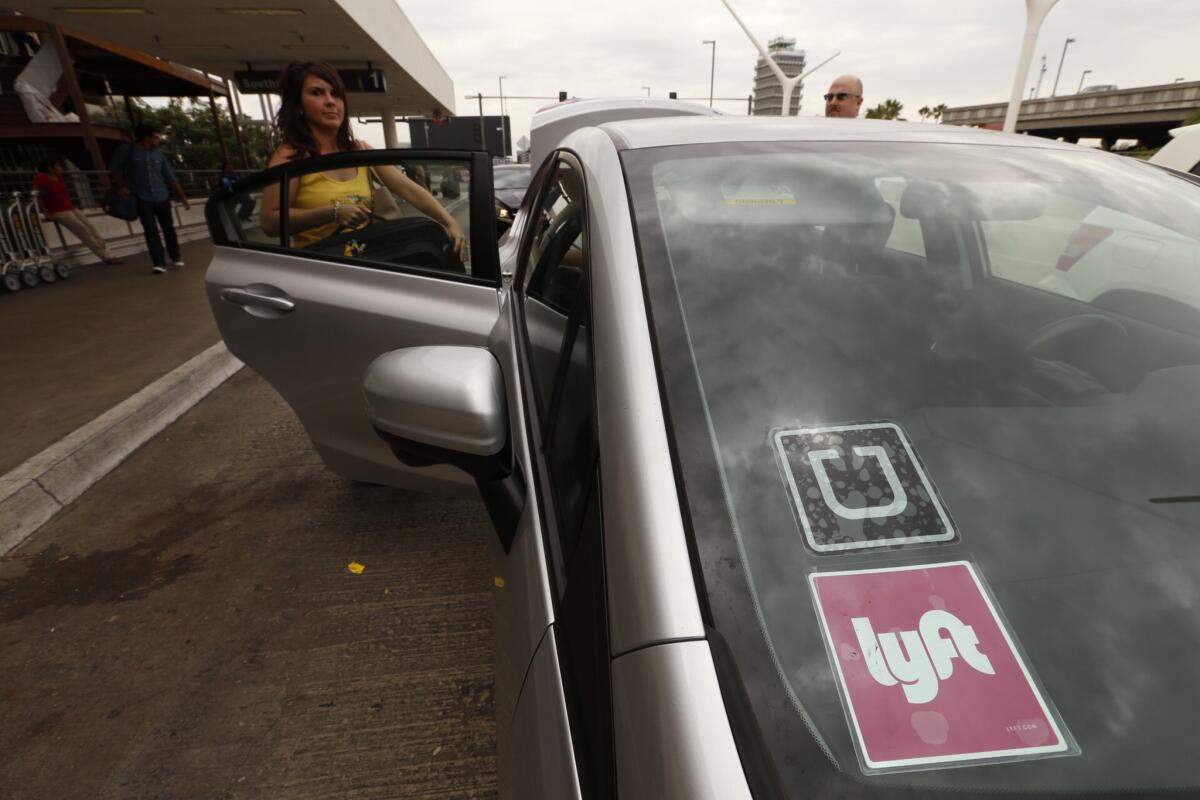California regulators permit Uber and Lyft to offer carpooling services

The PUC vote gives Uber and Lyft the green light to operate carpooling services such as UberPool and Lyft Line.
State regulators on Thursday granted companies such as Uber and Lyft permission to offer carpooling, sanctioning a service that has allowed fast-growing San Francisco companies to offer lower-cost rides.
After weeks of delays, the California Public Utilities Commission voted 4-1 on Thursday to approve commercial carpooling. Commissioner Mike Florio cast the sole vote opposing the motion because he wasn’t convinced that the decision was legal.
“If I were in the Legislature, I’d vote for this, but I’m not,” Florio said during the PUC meeting in San Francisco. “I think what the Legislature has said is clear: An individual fare is an individual fare, and we cannot go with this approach.”
Assemblyman Phil Ting (D-San Francisco) introduced a bill a year ago to change a 50-year-old Californian law that bars passengers sharing a commercial ride from being charged separately.
The bill passed the Assembly in May in a 69-0 vote, but has since stalled in the Senate.
The PUC vote gives Uber and Lyft the green light to operate carpooling services such as UberPool and Lyft Line. Those services had previously been able to operate because the PUC had chosen to not enforce the commercial carpooling law, acknowledging that it was out of date.
Although the decision lets ride-hailing firms breathe a sigh of relief for now, the PUC isn’t done with them yet.
Two other items — one concerning driver background check requirements and another defining “personal vehicles” — were put on hold for further discussion.
Companies such as Uber and Lyft vehemently oppose adding fingerprinting to their driver background checks, arguing that the process is flawed and places an unnecessary burden on the firms. The taxi industry, which uses fingerprinting in its driver screenings, says Uber and Lyft should adhere to the same rules taxis follow.
Current regulations require drivers for ride-hailing companies to use “personal vehicles” — a term the PUC has proposed defining as a car a driver has had for at least four months. But since some Uber drivers lease cars on a short-term basis, a cottage industry has arisen to provide quick access to vehicles. The PUC’s potential new rule could be blow to both drivers and short-term vehicle rental companies such as Hyrecar, Evercar, General Motors and Enterprise, as well as Uber and Lyft, which seek to keep as many drivers as they can on the road.
A General Motors representative spoke at the PUC meeting, arguing that the proposed rule would “stifle innovation and limit access to these vehicles by lower-income communities.”
GM has a vested interest in short-term car rentals, having recently announced a partnership with Lyft and launching a car-sharing service in Michigan called Maven.
The commissioners decided that more discussion was required, and the issue has been deferred to the next phase.
“We appreciate the commission delaying a decision on the type of short-term leasing partnerships that Lyft has with General Motors and Evercar,” a Lyft spokeswoman said. “These programs help people quickly and easily become a rideshare driver as a flexible way to make ends meet, and also help the state meet its environmental goals.”
While no date has yet been set for when the PUC will vote on those issues, Commissioner Liane M. Randolph, who drafted the decision, said the PUC plans “on doing this fairly expeditiously. We’re hoping to note have to wait another 2-3 years,” she said.
As ride-hailing firms won something of a reprieve in California, regulators in Pennsylvania slapped Uber with an $11.4-million fine Thursday for operating for six months in 2014 without permission, and for ignoring multiple requests for information. The California PUC hit Uber with a similar fine of $7.6 million last year for failing to meet data-reporting requirements.
ALSO
Rep. Hahn prods DirecTV, Time Warner Cable to restart Dodger channel talks
Harriet Tubman is the next face of the $20 bill; $5 and $10 bills will also change
Owners of emissions-cheating Volkswagens can choose buybacks or repairs, judge says
More to Read
Inside the business of entertainment
The Wide Shot brings you news, analysis and insights on everything from streaming wars to production — and what it all means for the future.
You may occasionally receive promotional content from the Los Angeles Times.











